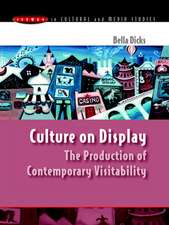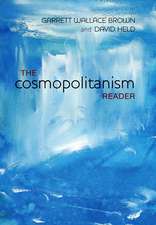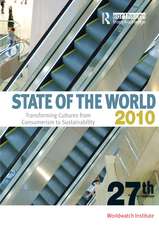Encouraging Sustainable Behavior: Psychology and the Environment
Editat de Hans C.M. van Trijpen Limba Engleză Paperback – aug 2013
The contributors are all leading social scientists in the field of consumer behavior who met the challenge to sketch out their theoretical perspectives, but also to go beyond their normal theorizing and think out of the box in order to show how these theoretical perspectives might be made actionable in terms of key managerial and policy perspectives toward sustainable development.
The result is a book that shows a wealth of information and approaches the question of how to encourage sustainable behavior from a myriad of divergent perspectives. This should stimulate scientists and policy-makers alike to find similarities, differences, and synergies between state-of-the-art psychological thinking about how to most effectively stimulate sustainable consumer behavior.
| Toate formatele și edițiile | Preț | Express |
|---|---|---|
| Paperback (1) | 458.84 lei 6-8 săpt. | |
| Taylor & Francis – aug 2013 | 458.84 lei 6-8 săpt. | |
| Hardback (1) | 1056.32 lei 6-8 săpt. | |
| Taylor & Francis – 7 ian 2014 | 1056.32 lei 6-8 săpt. |
Preț: 458.84 lei
Preț vechi: 539.81 lei
-15% Nou
Puncte Express: 688
Preț estimativ în valută:
87.80€ • 95.67$ • 73.98£
87.80€ • 95.67$ • 73.98£
Carte tipărită la comandă
Livrare economică 23 aprilie-07 mai
Preluare comenzi: 021 569.72.76
Specificații
ISBN-13: 9781848726499
ISBN-10: 184872649X
Pagini: 272
Ilustrații: 2 black & white illustrations, 2 black & white line drawings
Dimensiuni: 152 x 229 x 15 mm
Greutate: 0.39 kg
Ediția:New.
Editura: Taylor & Francis
Colecția Psychology Press
Locul publicării:Oxford, United Kingdom
ISBN-10: 184872649X
Pagini: 272
Ilustrații: 2 black & white illustrations, 2 black & white line drawings
Dimensiuni: 152 x 229 x 15 mm
Greutate: 0.39 kg
Ediția:New.
Editura: Taylor & Francis
Colecția Psychology Press
Locul publicării:Oxford, United Kingdom
Cuprins
Introduction. Y.R. Avramova, H.C.M. Van Trijp, Multiple Selves in Sustainable Consumption: An Introduction. Enhancing Sustainable Behavior in Everyday Life. J. De Jonge, A. Fischer, H.C.M. Van Trijp, Marketing and Sustainable Development: A Social Marketing Perspective. G. Miller, 27 Thoughts About Multiple Selves, Sustainable Consumption, and Human Evolution. S. Lindenberg, L. Steg, Goal-Framing Theory and Norm-Guided Environmental Behavior. D.G. Goldstein, I.M. Dinner, A Fairly Mechanical Method for Policy Innovation. Strengthening the Sustainability Goal. M.H.C. Meijers, M.K. Noordewier, Y.R. Avramova, I Just Recycled. Can I Use the Car Now? When People Continue or Discontinue Behaving Sustainably After an Initial Sustainable Act. K. Fujita, S.L. Clark, A.L. Freitas, "Think Globally, Act Locally": Construal Levels and Environmentally Relevant Decision-Making. T. Proulx, Is the Sky Falling? The Notion of the Absurd vs. the Feeling of the Absurd. J.C. Banfield, S. Shepherd, A.C. Kay, Consequences of System Defense Motivations for Individuals’ Willingness to Act Sustainably. Exploiting Self-Control in Sustainable Behavior. K.D. Vohs, B. Fennis, From Weakness to Strength: Low Self-Control Can Be Good for Sustainability. J.N. Gutsell, M. Inzlicht, A Neuroaffective Perspective on Why People Fail to Live a Sustainable Lifestyle. Making Sustainability Personally Relevant. M. Zeelenberg, J. Van Doorn, Acting on Emotion. P. Sparks, The Psychology of Sustainability: Attitudes, Identities, Actions, and Engaging with the Welfare of Others. T. Postmes, A. Rabinovich, T. Morton, M. Van Zomeren, Towards Sustainable Social Identities: Including our Collective Future into the Self-Concept. E. Focella, J. Stone, The Use of Hypocrisy for Promoting Environmentally Sustainable Behaviors. Enhancing Sustainable Behavior in Practice. S.A. Schwinghammer, This Was All Very Interesting, But How Can We Use it? A Practitioner’s Guide to Sustainable Behavior. Conclusion. H.C.M. Van Trijp, Recurring Themes on Sustainable Behavior and Their Implications for Intervention.
Notă biografică
Hans C. M. van Trijp holds the Chair of Marketing and Consumer Behavior at Wageningen University and is part-time Lead Scientist in Consumer Behavior at Unilever R&D in the Netherlands. His scientific work focuses primarily on the extent to which consumer behavior theory can be exploited to inform marketing strategies to enhance sustainable consumer behavior. He was the Scientific Director within the Dutch innovation program Transforum in the area of mobilizing consumer demand for sustainable products and services. He has published extensively in the marketing, consumer psychology, and food domains. He is a member of the editorial boards of the International Journal of Research in Marketing and Food Quality and Preference and chairs the Food and Consumer working group within the European Technology Platform Food for Life with the aim to leverage the research agendas between industry and governments across Europe.
Recenzii
"Environmental sustainability is one of the most critical issues of our time. This book offers insights from behavioral science that can help us to understand how we got into this predicament, and what strategies can help us to achieve a more sustainable future. This is an important and timely book."
-Wesley Schultz, Ph.D., California State University San Marcos
"This book is a highly inspiring collection of papers on the issue why people may not act in a sustainable way, even though they acknowledge the importance of doing so. Drawing on a wide range of perspectives from psychology and adjacent social science disciplines, it is convincingly shown why we cannot expect people to behave in a sustainable way just because we tell them to."
-Klaus G. Grunert, Ph.D., Aarhus University, Denmark
"This book is a wealth of information and appraoches the question of how to encourage sustainable behaviour from divergent perspectives."
-Lucia Reisch, Journal of Consumer Policy
-Wesley Schultz, Ph.D., California State University San Marcos
"This book is a highly inspiring collection of papers on the issue why people may not act in a sustainable way, even though they acknowledge the importance of doing so. Drawing on a wide range of perspectives from psychology and adjacent social science disciplines, it is convincingly shown why we cannot expect people to behave in a sustainable way just because we tell them to."
-Klaus G. Grunert, Ph.D., Aarhus University, Denmark
"This book is a wealth of information and appraoches the question of how to encourage sustainable behaviour from divergent perspectives."
-Lucia Reisch, Journal of Consumer Policy
Descriere
This book brings together a large number of divergent scientific disciplines and theoretical approaches to address and explain the multiple selves that drive the attitude-behavior discrepancy in consumer demand for sustainability.

























